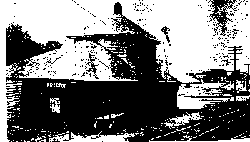

RAILROADS IN WEST RUTLAND
By
Matthew A. Smyrski
The first railroad to come through the town was the Rutland to Whitehall division. This was running by 1850.

In July 1876 these two roads were bought out by Delaware and Hudson railroad company.
These railroads carried marble to markets far beyond the boundaries of our state. As many as 24 trains a day past through West Rutland in the 1860's.
Then when quarries opened in Whipple Hallow and Clarendon, the D+H Railroad built extensions to them. These extensions carried workmen from West Rutland quarries and back home. As many as 90 men were transported to the Whipple Hollow quarry.


In July of 1890 the Clarenden+Pittsford got permission from the Rutland Village to cross streets in order to get to the Rutland Railroad Yards. The tracks were completed in 1891. Then some were torn up in the late 1920's.
I think the railroads were a great invention to bring people here for jobs. Building the railroad was a difficult and dangerous job.

Despite the difficulties, immigrants built 500 miles of tracks throughout the state. Doing this cost so many lives and about 6 million dollars. The iron horse had come to Vermont.
The railroads did not make a great deal of money for either the builders or the owners. But others in the state benefited a lot from the new industry. They could get goods to city markets quickly amend cheaply. The lumber and quarrying exploded with activity. Slate production alone increased by 500%. Farm values near the lines rose because it cost farmers less to get their products to market. Cattle prices were better because the cattle did not die on a long over land journey to market.
The railroads helped attract tourists to the Green Mountains. The railroads made a trip to the cool amend quite Green Mountains made it easier.

Large resorts sprang up because Vermont's tourist industry was launched thanks to the roads of the iron horse.
Riding these rails weren't always safe or comfortable. Derailing and collisions with animals and people caused many accidents. Wheels came off and boilers sometimes exploded.
Crossing a bridge was particularly dangerous. Freezing, thawing, flooding amend the weight amend sparks of the train caused the bridges to burn and collapse.

The railroads brought Vermont closer to the country and brought the country to it.
